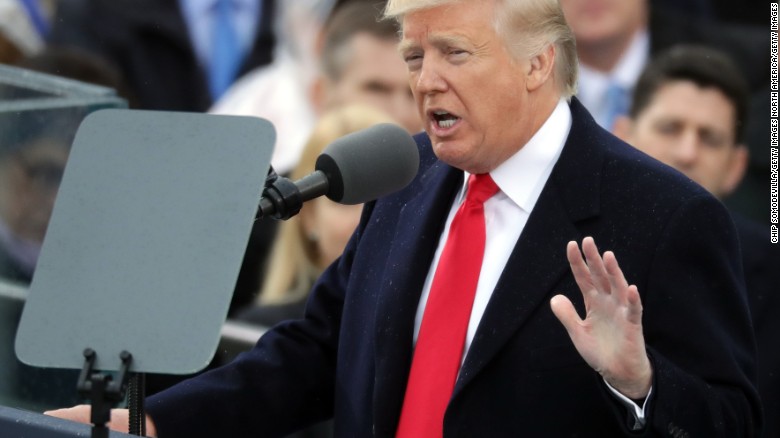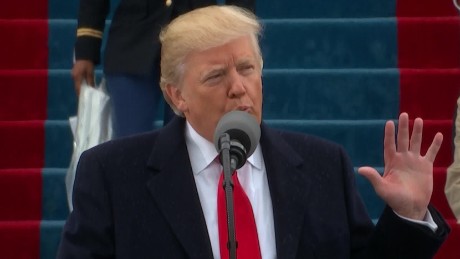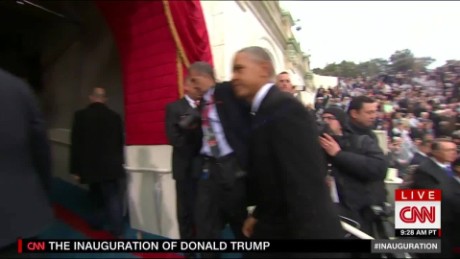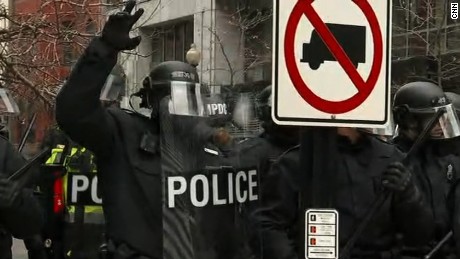Story highlights
- Trump makes no mention of the traditional US role as a global leader
- The new president says the priority will be America and American workers first
Washington (CNN)President Donald Trump, in his first address as the 45th US president, struck a protectionist, isolationist chord as he vowed to upend the way America relates to and does business with the rest of the world.
"We will seek friendship and goodwill with the nations of the world, but we do so with the understanding that it is the right of all nations to put their own interests first," Trump told the crowd as a light rain fell. "We must protect our borders from the ravages of other countries making our products, stealing our companies and destroying our jobs," Trump said.
"Protection will lead to great prosperity and strength," he added.
The President reprised his populist campaign themes, invoking a vision of American decline in the world and signaling changes to long-standing US foreign policy that few of his Cabinet nominees and officials have publicly echoed.
Trump's election rhetoric rattled many allies, and there was little in his inaugural address to reassure US partners or to put foes on notice that the US intends to stand up for its friends and democratic values.
He made no reference to America's traditional role as a global leader and shaper of international norms. Instead, he pointed at withdrawal -- a prospect that many foreign policy analysts warn could create a vacuum that China or Russia will move to fill.
"We do not seek to impose our way of life on anyone, but rather to let it shine as an example for everyone to follow," Trump said.
Instead, Trump framed US economic struggles as a result of policies oriented toward other countries.
"For many decades, we've enriched foreign industry at the expense of American industry, subsidized the armies of other countries while allowing for the very sad depletion of our military," Trump said.
"We've defended other nation's borders while refusing to defend our own and spent trillions of dollars overseas while America's infrastructure has fallen into disrepair and decay," he added. "We've made other countries rich while the wealth, strength, and confidence of our country has disappeared over the horizon."
The speech echoed his campaign stances, in which Trump blamed China for stealing American jobs, accused allies such as NATO and Gulf countries of taking advantage of US largesse and called for building a wall along the border with Mexico. As a candidate, Trump had proposed rewriting international trade deals and reconsidering alliances that have underpinned the international security order since World War II.
As Trump addressed the inaugural crowd, the White House website posted his "America First" foreign policy -- a phrase he emphasized in his speech.
The phrase "America First" is a loaded one, rooted in the years leading up to World War II when a group of that name urged Congress to stay out of the conflict. Historians today see the group that first used that name as isolationist, defeatist and anti-Semitic.
The 537-word foreign policy statement didn't offer any more details than Trump provided during the campaign, devoting more space to trade issues than traditional national security matters.
The document stated that the US will withdraw from the Trans-Pacific Partnership, a massive trade proposal that President Barack Obama championed, and renegotiate the North American Free Trade Agreement. If Canada and Mexico refuse to do so, "then the President will give notice of the United States' intent to withdraw from NAFTA."
The US will also crack down on nations that violate trade deals and "harm American workers in the process." Trump will tell his commerce secretary "to use every tool at the federal government's disposal to end these abuses," it added.
Trump's position on trade is at odds with standard Republican pro-trade views and indeed, he differs with them -- and even his own Cabinet members -- on many aspects of national security.
Trump's prospective secretary of state, retired ExxonMobil CEO Rex Tillerson, diverged from Trump as he described Russia as a "danger," affirmed his belief in climate change and said he supported the TPP in his confirmation hearings.
The President's designated ambassador to the UN, Nikki Haley, supports sanctions on Russia, which Trump has suggested easing. While Trump has dismissed the UN as a "club" for people who like a good time, Haley said "the UN matters." And she said there is no place for a registry of Americans based on religion. In a November interview, when asked by NBC whether there was going to be a database that tracks Muslims in the US, Trump said he "would certainly implement that."
Outside of trade, Trump's first foreign policy priority will be defeating ISIS and other "radical Islamic terror groups," the document said.
Referring to this security challenge as a clash of civilizations, Trump said in his remarks that the US will "unite the civilized world against radical Islamic terrorism, which we will eradicate completely from the face of the Earth."
The document listed as a second priority rebuilding the military to ensure that "our military dominance must be unquestioned." US military spending in 2015 was roughly the same as the next seven-largest military budgets combined, including China, Russia and the UK.
A third is embracing diplomacy. "We are always happy when old enemies become friends and when old friends become allies," the statement said, a possible reference to Russia. Trump has often said he wants to improve relations with Moscow, in part to fight terrorism. In his remarks, Trump said "we will reinforce old alliances and form new ones."
Trump's commitment to existing US alliances isn't entirely certain, however. He has dismissed NATO as "obsolete," though it is a bedrock part of the US international security umbrella from Afghanistan to Europe. And he has suggested re-examining ties to Gulf countries and Asian nations, such as Japan and South Korea, which have traditionally worked closely with Washington.
In nomination hearings, Trump's Cabinet members, including the secretary of defense pick James Mattis and Tillerson, took starkly different views, stressing the importance of and need for strong ties to NATO and support for Asian allies in China's shadow.










